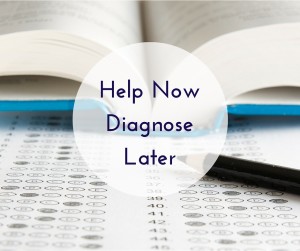Is a Dyslexia Diagnosis Necessary?
Written by Tori Whaley
Published on September 17, 2015
Help Now, Diagnose Later
In seven years as a special education teacher, I sat in countless meetings where we reviewed a child’s assessment scores with the parents. In some of those, I shared with parents the challenging news that their child met the criteria of having a disability under the special education law. In others, I shared that their child did not meet the criteria. Having observed many of these meetings, and talking with even more parents since beginning my work with Lexercise, my thoughts on diagnosis have shifted. Here are a few things parents should know about a diagnosis.
- Not qualifying for special education does not mean your child does not need help.
I understand why parents feel relieved when they hear their child does not have a learning disability. On the surface it seems like great news, right? Here’s the thing though: your child was referred in the first place for testing, which means that he or she is significantly behind. It means that the teacher is very concerned about his or her progress. It means that something about the current education system is not working for the child. It means your child needs help, whether or not special education is able to provide it. - Being diagnosed as dyslexic does not mean your child will qualify for special education. The guidelines that states use to determine whether to disburse funds allocated for special education service are not about diagnosis but about level of need. For instance, if a student has attention deficit hyperactivity disorder (ADHD), or a mobility impairment, or a genetic deficit but is able to function to an acceptable level in the general education classroom, he or she will not qualify for special education. The same is true with dyslexia. Even if your child is learning to read and spell through unreliable strategies and in a way that will impair his or her literacy as an adult, the key question for special education is whether academic achievement is in the acceptable range. For many dyslexics, especially bright dyslexics, this rings true.
- Therapists don’t need a diagnosis to begin improving your child’s outcomes. If you are looking for information about dyslexia, chances are your child is struggling with reading.
 While a diagnosis will give us some information about why he or she is having a hard time, we can start improving his or her reading without a diagnosis. When you start therapy without a diagnosis, your clinician will do some quick assessments to determine whether your child has language comprehension difficulties, which would be the primary reason Structured Literacy would not work. For the same price as some evaluations, you could have bought enough therapy to get your child reading on grade level! So, why not start your child with therapy, see how they respond and then decide whether to test?
While a diagnosis will give us some information about why he or she is having a hard time, we can start improving his or her reading without a diagnosis. When you start therapy without a diagnosis, your clinician will do some quick assessments to determine whether your child has language comprehension difficulties, which would be the primary reason Structured Literacy would not work. For the same price as some evaluations, you could have bought enough therapy to get your child reading on grade level! So, why not start your child with therapy, see how they respond and then decide whether to test? - Different states, and schools have different requirements for a dyslexia diagnosis. Since I started working with Lexercise, I’ve heard it all. “It’s a medical diagnosis, so your doctor has to make it” (Except that most doctors don’t do that kind of testing). “You need a neuropsychological evaluation” (Except that then they do the same intellectual and achievement testing most schools do for special education, which does not identify dyslexia). Schools often don’t have the resources to provide adequate help to dyslexic children, let alone diagnose them! Therapists who have worked with dyslexic kids know them when they see them. With most kids, I can look at a writing sample and tell whether it’s dyslexia in a matter of minutes. That’s not usually enough to get accommodations from the school and certainly not enough for special education, but it’s plenty for me to start teaching the kid to read, write and spell. Accommodations can be a vital part of a child’s academic success, but on the whole, learning to read is more important. While accommodations can be provided at any time with a diagnosis, the window for maximum language and literacy learning is much narrower and does not require a diagnosis to begin.
If your primary goal is to find out in great detail what is going on in your child’s brain, testing is the way to get that information. But, if your priority is to get your child reading and learning in a way that makes sense to them then I highly suggest you seek therapy sooner rather than later. As a result you can save you and your child time and frustration and start celebrating their improvement! Start getting help now and get a diagnosis later if you feel it’s still necessary.
Improve Your Child’s Reading
Learn more about Lexercise today.
Schedule a FREE
15-minute consultation

